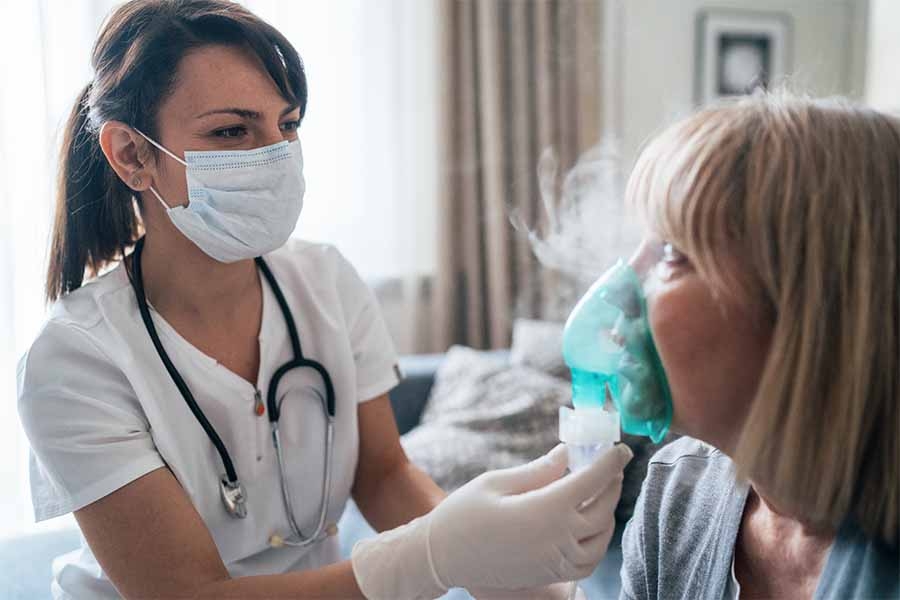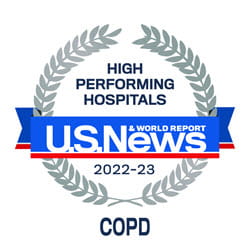
Respiratory Care
What Is Respiratory Care?
Respiratory care is the branch of medicine that is concerned with maintaining the health of the human respiratory system. The respiratory system includes the mouth, nose, throat, and lungs – the primary structures and organs of breathing. Respiratory care encompasses the entire range of practices and procedures associated with the scientific method in medicine, including prevention, diagnosis, treatment, recovery, and rehabilitation as they relate to illness or injury.
At Baptist Health, respiratory care is one of our clinical specialties. Our physicians, respiratory therapists, and other care providers deliver comprehensive care, from diagnosis to treatment, for a wide range of respiratory issues, both chronic and acute. You’ll breathe easier, knowing that we’re on your side in the battle for lung health.
Does Respiratory Care Go by Any Other Names?
You will frequently see respiratory care referred to as respiratory therapy. The two phrases are used interchangeably. Pulmonology and chest medicine are two other ways of referring to scientific practices aimed at maintaining the health status of the human respiratory system.
What Conditions Does Respiratory Care Treat?
Respiratory care treats many conditions that impact your breathing. Respiratory care treats infants, children, and adults. Respiratory conditions include pneumonia, sleep apnea, chronic bronchitis, emphysema, cystic fibrosis, and lung cancer. Pneumoconiosis is one lung disease treated by respiratory care.
Medical therapies involved with respiratory treatment:
- Lung assessment—Respiratory therapists will evaluate your breathing and lung function.
- Breathing treatment—Your respiratory therapist will develop an individualized care plan to treat your breathing and lung challenges. This care plan might involve delivering oxygen or medicine to your lungs, using ventilators, or learning breathing exercises that you can practice at home.
- Monitoring—Respiratory therapists often provide ongoing monitoring of your lung function and other vital signs.
How Is Respiratory Care Provided?
Respiratory care is provided in stages similar to those of the other branches of medicine:
- Diagnostic stage: This stage involves a consideration of disease factors and agents, along with basic information-gathering procedures, such as auscultation (using a stethoscope to listen to lung function).
- Clinical stage: More advanced forms of information-gathering include specimen collection and laboratory analysis, spirometry, pulmonary function tests, bronchoscopy, chest X-rays, CT scanning, and so forth.
- Surgical stage: Invasive procedures of the thorax or chest cavity are called thoracic surgery. These often focus on more serious respiratory or cardiopulmonary issues.
- Rehabilitative stage: This stage encompasses procedures for helping patients recover from a respiratory injury or illness, or to manage an ongoing (chronic) condition.
You can read about our diagnostic, treatment, and rehabilitative procedures for respiratory disorders in more detail on the Baptist Health Web site.
Who Provides Respiratory Care?
Like other forms of medicine, respiratory care is delivered by teams of individuals with specialized training in a variety of treatment and rehabilitative methods:
- Pulmonologists: Pulmonologists are physicians with specialized training in internal medicine and respiratory subspecialties. They coordinate the care of their patients, in addition to performing many of the essential tasks themselves.
- Respiratory therapists (RTs): Respiratory therapists are healthcare practitioners with specialized training in managing respiratory diseases and conditions. They provide a wide range of educational and therapeutic services for respiratory-care patients, under the supervision of a pulmonologist and other physician.
- Medical technicians, nurses, and other caregivers: Pulmonologists and RTs are assisted in care delivery by other trained healthcare professionals.
What Do Respiratory Therapists Do?
Respiratory therapists tackle a diversity of tasks daily. These might include:
- Reviewing vital signs
- Administering medications
- Managing artificial airways and mechanical-ventilation systems
- Conducting spirometric and arterial blood-gas tests
- Collecting specimens for analysis
- Analyzing chest X-rays and CT scans
- Conducting stress, sleep, and other tests
- Overseeing rehabilitation activities
- Providing critical care information to patients and family members
- Teaching smoking-cessation and other disease-prevention classes
- Working in concert with physicians and other medical-team members to protect and preserve the health of the persons in their care.
What Kind of Training Do Respiratory Therapists Receive?
Respiratory therapists are required by law to meet the following educational and training standards:
- Minimum of an associate’s degree from an accredited respiratory therapy education program. Many RTs earn a bachelor’s or graduate degree in addition.
- Completion of a credentialing process, as sponsored by the National Board for Respiratory Care. Several RT specialist credentials are available.
- Professional licensing, as administered by the appropriate regulating body.
How Does Baptist Health Use Respiratory Therapy?
Respiratory therapy is an integral part of the way Baptist Health serves the medical needs of all our communities. We are committed to offering clinical excellence, compassionate care, and patient-centered focus in everything we do.
Respiratory therapists typically work in hospitals and assist doctors and nurses in many medical departments to take care of people with lung or breathing problems.
Types of respiratory care therapies:
- Pediatric Respiratory Therapy—This is a specialized area of respiratory care that treats infants, children, and adolescents. Respiratory therapists provide medical treatment, diagnostic testing, consultations, or referrals for pediatric patients with breathing conditions. Examples of these conditions include chronic airway disease and sleep disorders.
- Adult Respiratory Therapy—This therapy treats adults with breathing-related problems. Therapists might help adults improve lung function after an injury or surgery. Respiratory therapists might also treat emphysema and help adults with smoking cessation.
- Geriatric Respiratory Therapy—This therapy helps improve lung function in older adults. Common breathing problems treated with this therapy include bronchial pneumonia, respiratory tract infections, and chronic obstructive pulmonary disease.
- Emergency Respiratory Therapy—This therapy provides help to doctors in emergency situations such as when patients experience acute respiratory failure or undergo heart surgery. Acute respiratory failure is a condition where excess fluid accumulates in the air sacs of your lungs. A common medical tool in emergency respiratory therapy is the ventilator, which assists patients with breathing and lung function.
When It Comes to Respiratory Health, We’re a Breath of Fresh Air
If you’re dealing with a respiratory ailment or condition, see your Baptist Health physician. He or she will be able to assess your condition and determine which medical treatments, if any, are most appropriate for you.
Know Your Risk
Choose an assessment and location before you begin.
Lung Cancer
Lung cancer is a major health issue in the United States. This quick lung cancer risk assessment can help you identify your lung cancer risk factors and determine if a lung cancer screening is recommended for you.
Treatment for COPD
Featured Awards
Baptist Health Hardin and Paducah have been recognized as a 2022-23 High Performing Hospital for COPD. This is the highest award a hospital can earn for U.S. News’ Best Hospitals Procedures & Conditions ratings.

